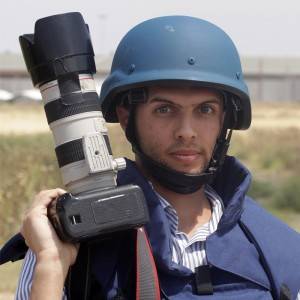UNRWA employees who were to be forced in to retirement or see their contracts come to an end this month can continue working in September under the terms of a deal agreed between labour unions and the UN body.
“Through the intervention of many mediators … today an agreement was made with the organisation’s management on a number of points,” the labour union representing UNRWA employees said today.
“The 116 employees threatened with retirement at the end of August will continue their work as usual during September 2018,” the statement continued.
PLC: UNRWA’s crisis ‘political, not financial’
Workers who were to receive part-time contracts will continue to work full time in September.
During this period further talks will be held to set up permanent solutions for these employees.
“We will keep working until we attain the rights of employees,” the statement concluded.
“We will take this tour until we reach the rights of employees and we will remain faithful to your just causes.”
UNRWA has faced protests for over a month since it announced its to dismiss 13 per cent of its emergency programme workers, move 57 per cent on to part-time contracts, and the rest on to temporary contracts which end later this year means job insecurity. Around 1,000 employees working in emergency programmes are threatened with dismissal by the end of this year.
The UN body has been suffering from a severe budget deficit which has been exacerbated by America’s freeze on aid to Palestine since the start of 2018, when President Donald Trump’s administration declared an internal review of its policy. The president also announced that $65 million would be withheld from UNRWA, the UN body that provides education, healthcare and social services to Palestinians in the West Bank, Gaza and occupied East Jerusalem, as well as those Palestinians living in neighbouring Lebanon, Jordan and Syria.
No one has the power to change the nature of the agency’s work, insists UNRWA



![UNRWA agrees temporary deal to end Gaza workers’ protestsc7 Protest outside UNRWA after employees were to be forced in to retirement [Mohammed Asad/Middle East Monitor]](https://i0.wp.com/www.middleeastmonitor.com/wp-content/uploads/2018/08/UNRWA-agrees-temporary-deal-to-end-Gaza-workers’-protestsc7.jpg?w=797&h=531&ssl=1)
![UNRWA agrees temporary deal to end Gaza workers’ protestsIMG_8674 Protest outside UNRWA after employees were to be forced in to retirement [Mohammed Asad/Middle East Monitor]](https://i0.wp.com/www.middleeastmonitor.com/wp-content/uploads/2018/08/UNRWA-agrees-temporary-deal-to-end-Gaza-workers’-protestsIMG_8674.jpg?w=395&h=264&ssl=1)
![UNRWA agrees temporary deal to end Gaza workers’ protestsc1 Protest outside UNRWA after employees were to be forced in to retirement [Mohammed Asad/Middle East Monitor]](https://i0.wp.com/www.middleeastmonitor.com/wp-content/uploads/2018/08/UNRWA-agrees-temporary-deal-to-end-Gaza-workers’-protestsc1.jpg?w=395&h=263&ssl=1)
![UNRWA agrees temporary deal to end Gaza workers’ protestsc2 Protest outside UNRWA after employees were to be forced in to retirement [Mohammed Asad/Middle East Monitor]](https://i0.wp.com/www.middleeastmonitor.com/wp-content/uploads/2018/08/UNRWA-agrees-temporary-deal-to-end-Gaza-workers’-protestsc2.jpg?w=396&h=264&ssl=1)
![UNRWA agrees temporary deal to end Gaza workers’ protestsc3 Protest outside UNRWA after employees were to be forced in to retirement [Mohammed Asad/Middle East Monitor]](https://i0.wp.com/www.middleeastmonitor.com/wp-content/uploads/2018/08/UNRWA-agrees-temporary-deal-to-end-Gaza-workers’-protestsc3.jpg?w=396&h=264&ssl=1)
![UNRWA agrees temporary deal to end Gaza workers’ protestsc4 Protest outside UNRWA after employees were to be forced in to retirement [Mohammed Asad/Middle East Monitor]](https://i0.wp.com/www.middleeastmonitor.com/wp-content/uploads/2018/08/UNRWA-agrees-temporary-deal-to-end-Gaza-workers’-protestsc4.jpg?w=396&h=264&ssl=1)
![UNRWA agrees temporary deal to end Gaza workers’ protestsc5 Protest outside UNRWA after employees were to be forced in to retirement [Mohammed Asad/Middle East Monitor]](https://i0.wp.com/www.middleeastmonitor.com/wp-content/uploads/2018/08/UNRWA-agrees-temporary-deal-to-end-Gaza-workers’-protestsc5.jpg?w=596&h=397&ssl=1)
![UNRWA agrees temporary deal to end Gaza workers’ protestsc6 Protest outside UNRWA after employees were to be forced in to retirement [Mohammed Asad/Middle East Monitor]](https://i0.wp.com/www.middleeastmonitor.com/wp-content/uploads/2018/08/UNRWA-agrees-temporary-deal-to-end-Gaza-workers’-protestsc6.jpg?w=596&h=397&ssl=1)








